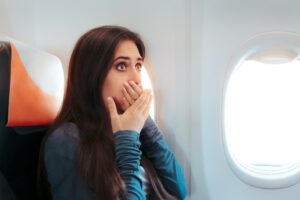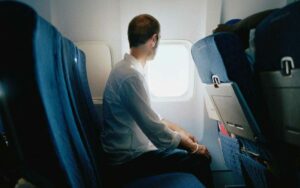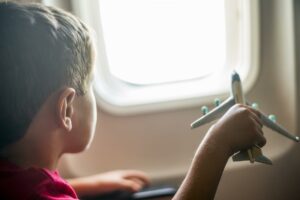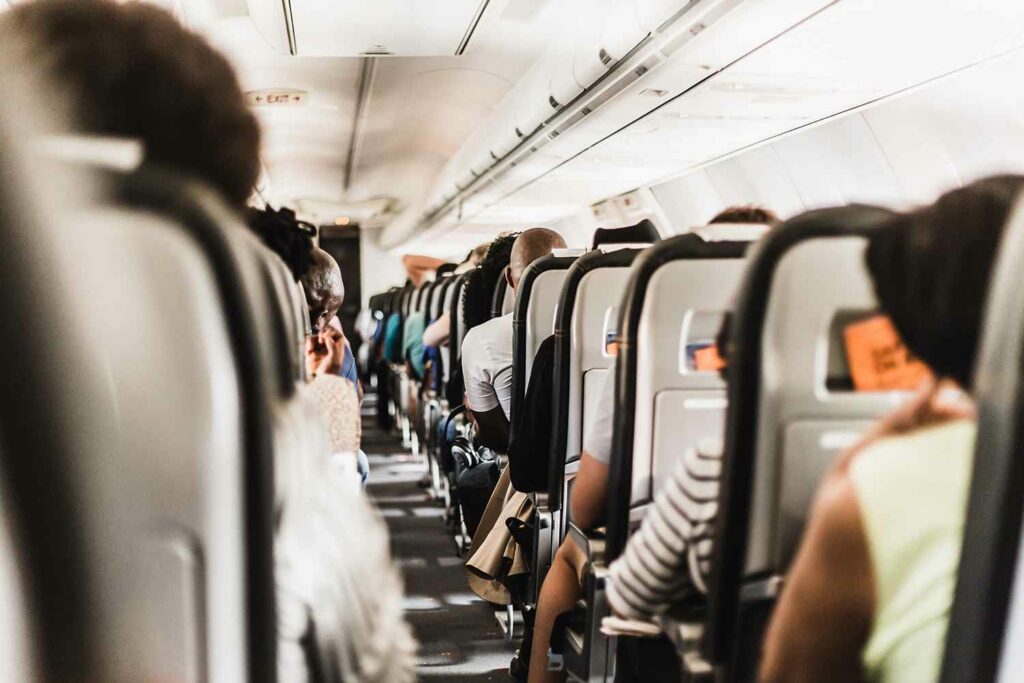Are you one of those individuals who break into a cold sweat at the mere thought of boarding an airplane? Does the idea of flying make your heart race, your palms sweaty, and your anxiety levels skyrocket? You’re not alone. The fear of flying, also known as aviophobia, affects millions of people around the world. But the good news is that it’s a fear that can be conquered. In this comprehensive guide, we will explore the fear of flying treatment options and strategies to finally experience the freedom and adventure of air travel.
Contents
When To Seek Flying Phobia Treatment?
 Knowing when to seek flying phobia treatment is essential to address your fear effectively. Aviophobia, or the fear of flying, can significantly impact your life and limit your opportunities for travel and personal growth. Here are some signs and situations that indicate it may be time to seek treatment:
Knowing when to seek flying phobia treatment is essential to address your fear effectively. Aviophobia, or the fear of flying, can significantly impact your life and limit your opportunities for travel and personal growth. Here are some signs and situations that indicate it may be time to seek treatment:
- Avoidance Behavior: If you consistently avoid flying or go to great lengths to find alternative transportation methods. Such as driving long distances or taking trains or buses, your fear may be negatively affecting your life.
- Intense Anxiety: If the thought of flying or being on an airplane induces intense anxiety, panic attacks, or physical symptoms like rapid heartbeat, sweating, trembling nausea, or shortness of breath, it’s a clear sign that your fear is distressing and may require treatment.
- Impact on Quality of Life: When your fear of flying starts to interfere with your personal or professional life, preventing you from attending important events, taking career opportunities, or spending quality time with loved ones, it’s time to seek help.
- Persistent Fear: If your fear of flying has persisted for an extended period, such as six months or more, and shows no signs of improving on its own, seeking treatment is a reasonable step.
- Prior Failed Attempts: If you’ve tried to overcome your fear of flying on your own and have been unsuccessful or experienced only temporary relief, it’s a good indication that professional treatment may be necessary.
- Desire for Change: If you genuinely want to overcome your fear of flying and feel that it’s holding you back from living life to the fullest. Then, this desire for change is a strong motivator to seek treatment.
It’s important to remember that seeking fear of flying treatment is a positive step towards improving your quality of life. And experiencing the freedom and opportunities that air travel can offer. Don’t hesitate to reach out to a mental health professional who specializes in treating phobias or anxiety disorders.
What Are Some Flying Phobia Treatment Options?
Treating flying phobia, also known as aviophobia, involves a range of strategies and therapies designed to help individuals overcome their fear of flying. Here are some fear of flying treatment options, including various therapies:
Cognitive-behavioral therapy (CBT)
Cognitive-behavioral therapy is a well-established and highly effective treatment for flying phobia. During CBT sessions, a trained therapist helps you identify and challenge the irrational thoughts and beliefs that contribute to your fear of flying. By examining and restructuring these thought patterns, you can gradually reduce the anxiety associated with air travel. CBT also includes practical techniques like relaxation exercises, desensitization, and positive self-talk, enabling you to develop coping strategies for dealing with your fear.
Exposure Therapy
 Exposure therapy is a crucial component of CBT, and it’s specifically tailored to confront your fear of flying. Through a systematic and gradual approach, you expose yourself to increasingly anxiety-inducing situations related to air travel. Starting with less intimidating steps, such as looking at pictures of airplanes or visiting an airport, you work your way up to more challenging tasks like sitting on a stationary plane or taking short flights.
Exposure therapy is a crucial component of CBT, and it’s specifically tailored to confront your fear of flying. Through a systematic and gradual approach, you expose yourself to increasingly anxiety-inducing situations related to air travel. Starting with less intimidating steps, such as looking at pictures of airplanes or visiting an airport, you work your way up to more challenging tasks like sitting on a stationary plane or taking short flights.
Virtual Reality Exposure Therapy
Leveraging technology, virtual reality exposure therapy provides a safe and controlled environment for individuals to face their fear of flying. Using VR simulations, you can experience the sensations of flying without actually boarding an airplane. Therapists can customize scenarios to match your specific triggers and gradually increase the level of exposure, allowing you to practice managing your anxiety.
Medications
Medications may be recommended in some cases to alleviate the symptoms of anxiety associated with flying. These could include anti-anxiety medications like benzodiazepines or short-term use of medications like beta-blockers to reduce physical symptoms like a rapid heartbeat. It’s important to consult with a healthcare provider to determine if medication is suitable for your situation and to discuss potential side effects and risks.
Hypnotherapy
Hypnotherapy involves guided relaxation and focused attention to access your subconscious mind. A trained hypnotherapist can help you reframe negative beliefs and emotions related to flying. Through hypnosis, you can work on replacing fear with a more positive and relaxed mindset. This can be particularly effective for those open to this approach.
Biofeedback and Relaxation Techniques
Learning relaxation techniques such as deep breathing, progressive muscle relaxation, or mindfulness meditation can empower you to manage anxiety during flights. Biofeedback provides real-time data on physiological responses like heart rate and muscle tension. And, enabling you to gain better control over your stress reactions and reduce fear-related symptoms.
Desensitization Apps
Smartphone apps designed for desensitization offer a convenient way to practice coping with your fear of flying. These apps typically provide virtual exposure scenarios and relaxation exercises that you can access on your own time. While they are not a substitute for professional treatment, they can be a useful tool for reinforcement between therapy sessions.
Choosing the right treatment option or combination of options depends on your individual circumstances and the severity of your flying phobia. It’s essential to consult with a mental health professional who can assess your specific needs and create a tailored treatment plan to help you overcome your fear of flying effectively.
What Are Some Self-help Strategies For Flying Phobia?
 Self-help strategies for flying phobia can be effective in managing and gradually overcoming your fear of flying. These techniques are designed for individuals who prefer to work on their own or as supplements to professional treatment. Here are some self-help strategies for flying phobia:
Self-help strategies for flying phobia can be effective in managing and gradually overcoming your fear of flying. These techniques are designed for individuals who prefer to work on their own or as supplements to professional treatment. Here are some self-help strategies for flying phobia:
Education and Understanding
- Educate yourself about the science of aviation and how airplanes work. Understanding the mechanics of flight can demystify the process and reduce anxiety.
- Learn about the safety statistics of air travel, which can help rationalize your fear by highlighting its rarity.
Breathing and Relaxation Techniques
- Practice deep breathing exercises to calm your nerves. Inhale slowly through your nose for a count of four, hold for four, and then exhale through your mouth for four.
- Explore progressive muscle relaxation techniques to release physical tension and promote relaxation before and during flights.
Positive Visualization
- Use positive imagery to visualize yourself having a calm and enjoyable flight. Imagine the sights, sounds, and sensations of a successful journey.
- Create a mental “safe place” that you can retreat to when anxiety arises, such as a serene beach or a peaceful forest.
Positive Affirmations
- Develop a set of positive affirmations related to flying, such as “I am safe during flights” or “I can manage my anxiety effectively.” Repeat these affirmations to yourself as needed.
- Challenge negative thoughts with rational and positive self-talk. Ask yourself if your fears are based on facts or assumptions.
Self-Paced Exposure
- Gradually expose yourself to flying-related stimuli at your own pace. Start with non-threatening steps like watching videos of flights or visiting an airport without flying.
- As you become more comfortable, progress to sitting in a stationary airplane or taking shorter flights to build confidence.
Travel Companions
- Consider traveling with a supportive friend or family member who understands your fear and can provide reassurance during the flight.
- Communicate your concerns with the cabin crew, so they are aware of your anxiety and can assist as needed.
Distraction Techniques
- Bring entertainment like books, movies, or music to divert your attention during the flight.
- Engage in in-flight activities like crossword puzzles or Sudoku to keep your mind occupied.
Pre-flight Preparation
- Plan your trip well in advance to reduce last-minute stressors. Arrive at the airport early to allow ample time for security checks and boarding.
- Familiarize yourself with the layout of the airport and the procedures you’ll encounter.
Remember that overcoming a fear of flying may take time, patience, and persistence. It’s okay to start with small steps and gradually work your way up to longer flights if needed. If self-help strategies alone are not sufficient, or if your fear of flying is severely impacting your life, seeking professional help from a therapist or counselor who specializes in treating phobias is highly recommended.
Conclusion
In conclusion, conquering the fear of flying, or aviophobia, is a journey that empowers individuals to unlock a world of possibilities and adventure. By exploring a range of self-help techniques, from education and relaxation exercises to positive affirmations and visualization, individuals can take meaningful steps toward overcoming their fear. These strategies, when combined with the guidance of mental health professionals, exposure therapy, or even innovative technologies like virtual reality, offer a path to liberation from the constraints of flying phobia.
With patience, determination, and a commitment to personal growth, anyone can transform their fear into a source of strength. And, allowing them to soar through the skies with confidence and embrace the incredible experiences that air travel can offer. If you are looking for an affordable Online Therapy TherapyMantra can help: Book a trial Online therapy session


